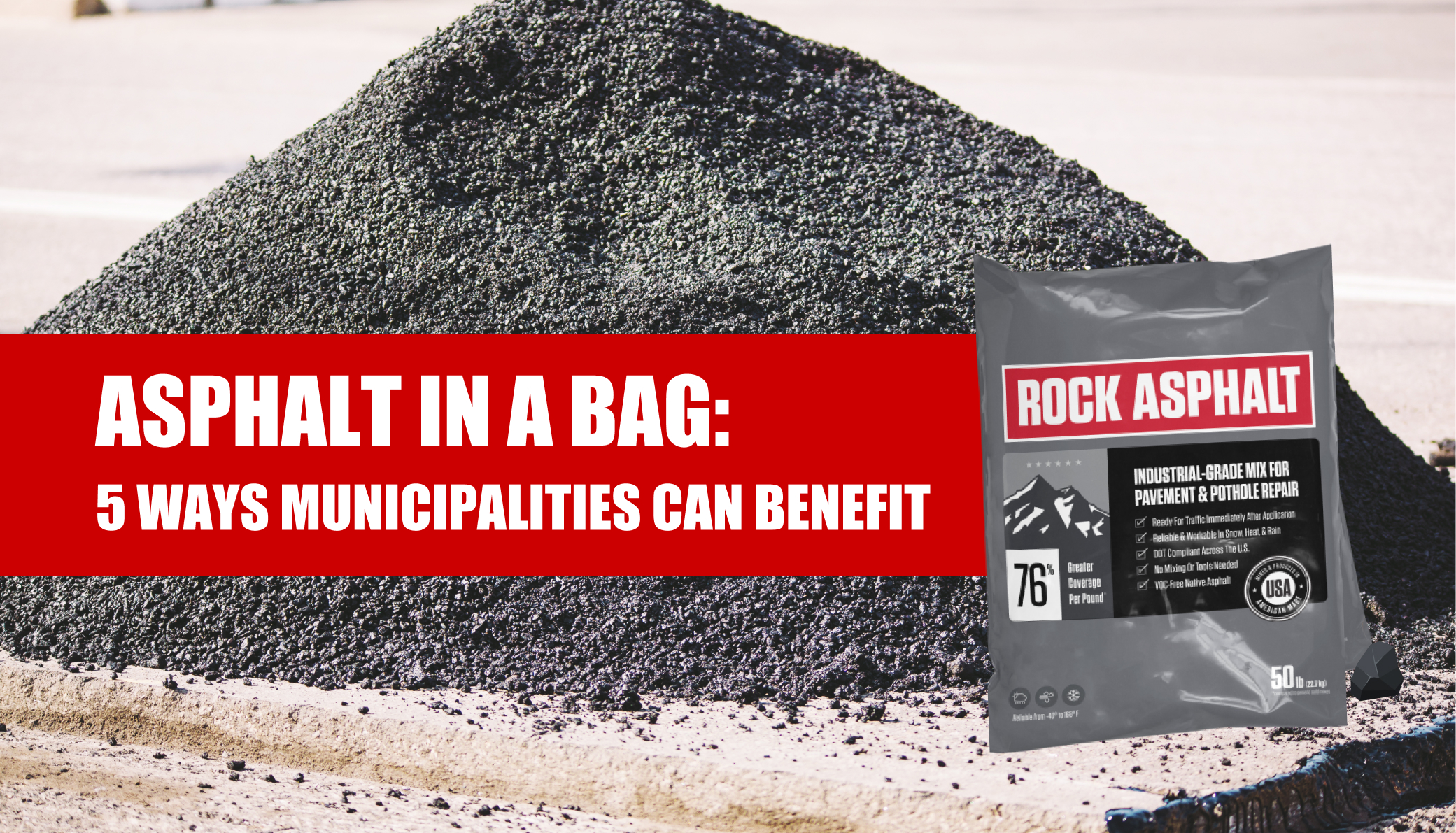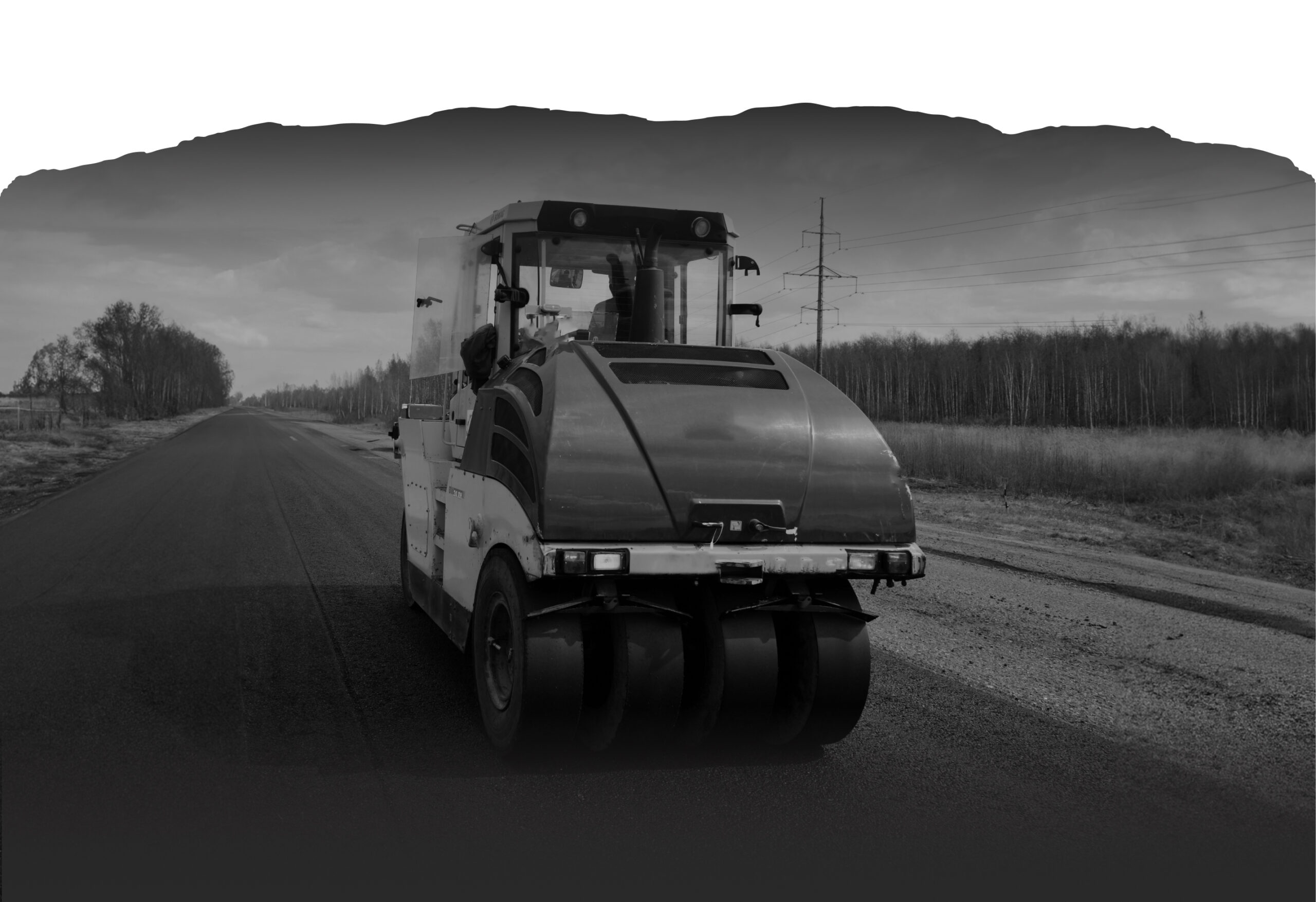Asphalt in a Bag: 5 Ways Municipalities Can Benefit

Asphalt in a bag is a staple of municipal road maintenance. It’s the go-to material for quick pothole patching and other small repairs, especially when hot mix isn’t available. The asphalt industry offers a variety of options from weather-specific formulas to water-activated mixes. While asphalt in a bag is handy, the results can be mixed.
Asphalt in a bag is infamously messy, hard to apply, and generally doesn’t last long. It’s common for bags to harden or rip open and cleanup can take longer than the repairs themselves. Some formulas require additional materials, heavy machinery, and lengthy curing times. These curing times lead to one of the biggest headaches of municipalities everywhere, failed pothole patches.
So Why Is Asphalt in a Bag Still Used?
Despite its problems, bagged asphalt remains a staple for municipalities everywhere due to one simple reason: availability.
When a dangerous pothole calls for immediate action, bagged asphalt is ready to pick up at the local hardware store. Municipalities accept the reality of broken bags, hours of cleanup, and the extra cost of reworking failed patches in exchange for convenience.
But there is a way to fix that too. Here are 5 ways municipalities can benefit from using asphalt in a bag, as long as it’s the right one:
-
Asphalt in a Bag Without All the Mess
It’s no secret that asphalt is a messy material. Most bagged formulas are mixes of rocks coated in a tarry, oily binder, which makes the bags heavy. These heavy bags are prone to ripping open, causing hours of cleanup and another trip to the hardware store.
Bagged asphalt is known to ruin the insides of vehicles, track into buildings, and result in hours of cleaning equipment with expensive and hazardous chemicals.
These oily mixtures are also challenging to apply. A single tear in a bag of asphalt can cause its entire contents to harden. Road crews spend hours fighting with hardened material and using more bags than originally needed.
So Why Is RockAsphalt© Bagged?
When first opening a bag of RockAsphalt© it may appear as if it’s dried out, but this is just the natural makeup of the material.
RockAsphalt© is composed of Anacacho limestone imbued with natural bitumen and remains dry until it is compacted. This dry consistency holds a significant benefit for municipalities.
The material is 100% VOC-free and safe to handle. It also doesn’t stain clothes or vehicles. The material is lighter than traditional asphalt in a bag and doesn’t clump or harden with moisture exposure. The dry, lightweight nature of RockAsphalt© makes application easy, fast, and clean.
-
Eliminating the Wait with Bagged Asphalt
Most asphalt in a bag relies on chemical binders to form a bond. During the curing period of these chemicals, the asphalt undergoes a process where it hardens and reaches its full strength. These curing periods can vary depending on the formula, the thickness of the mix, and variations in the weather. Before hardening, the asphalt remains malleable and is prone to failing under the weight of traffic.
Curing periods can take anywhere from a few hours to a few weeks. This poses a dilemma for municipalities that must reopen roads to traffic. It’s common for patched potholes to fail under the weight of traffic due to being reopened before asphalt can cure.
The unique properties of RockAsphalt© allow municipalities to reopen a patched pothole to traffic immediately after application. This is because the binder in RockAsphalt© hardens with compaction, not weather or time-sensitive chemicals. Road crews can repair potholes in minutes and reopen traffic without the fear of heavy traffic ripping up the patch.
-
Asphalt in a Bag Reduces Bulk Waste
By packaging asphalt in individual bags, the amount needed for each repair is pre-measured, reducing waste and excess material that often comes with bulk purchases.
When bulk cold mix is stored outside, it begins to lose its effectiveness as time and weather deteriorate the material. Municipalities run the risk of wasting tons of material and thousands of dollars due to the large purchase minimums and insufficient preservation strategies.
RockAsphalt© is available in standard 50 lb. bags of asphalt, but we’ve decided to take asphalt in a bag to the bulk level.
Totes of RockAsphalt© deliver 2,350 lbs. of fresh, sealed asphalt that stores twice as long as bulk cold mix.
Totes can be stored inside or outside and eliminate messy piles of bulk cold mix. Overall, municipalities that utilize asphalt in a bag maximize the longevity of their asphalt, even when it’s bulk.
-
RockAsphalt© Bags Eliminate Rework
While asphalt in a bag has aided municipalities with potholes, it’s also led to an increase in rework. The malleable nature and long curing times of most bagged asphalt cannot withstand heavy traffic and weather. It’s common for potholes patched with bagged asphalt to be reworked multiple times in the span of a year.
Reworking failed patches can cost municipalities hundreds, if not thousands in extra time, money, and manpower. RockAsphalt© eliminates rework by offering a 3-year guarantee. We’re so confident in the performance of our asphalt that we’ll replace any patch that doesn’t last for three years.
-
Asphalt in a Bag Can Unlock New Repair Strategies
Asphalt in a bag paved the way for municipalities to repair potholes with hand tampers instead of hot box trucks and specialized patching machines. This innovation in asphalt streamlined repairs and minimized the costs associated with heavy machinery maintenance.
However, bagged asphalt is still largely dependent on equipment, and this can cause problems for municipal road maintenance.
Using water-activated patches can pose logistical issues for widescale pothole repairs. Some formulas require upwards of a gallon per repair. Other bags, while applied at ambient temperatures, still require the aid of vibratory plate compactors for compaction. Road crews use torches to loosen up hardened cold mix and concrete saws to square pothole edges.
RockAsphalt© takes this innovation one step further by reducing equipment to the bare minimum.
With no need for heavy machinery, tack coats, concrete saws, or extra tools, road crews can effectively repair potholes with a broom, bags of RockAsphalt©, and a vehicle for compaction. Our material even makes basic tools like hand tampers unnecessary. Overall, municipalities that use RockAsphalt© streamline their pothole repairs with no extra costs in equipment.
Asphalt in a Bag: The Next Step
Asphalt in a bag has helped countless municipalities tackle pothole repairs, but the results are often temporary, messy, and more expensive than they appear. If you are responsible for road maintenance in your municipality, reach out to us to learn more about how you can take asphalt in a bag to the next level with RockAsphalt©.

Ready to do road repairs the fast & easy way?
RockAsphalt© replaces cold and hot mix making road repair of all sizes fast, clean, simple and permanent the first time.
Try it for yourself and learn why crews love it.
Get your free sample bags and have your team see how fast and easy it is to permanently fix potholes.


